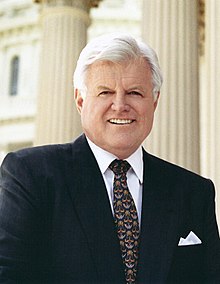Ted Kennedy | |
|---|---|
 Official portrait, 1990s | |
| United States Senator from Massachusetts | |
| In office November 7, 1962 – August 25, 2009 | |
| Preceded by | Benjamin A. Smith II |
| Succeeded by | Paul G. Kirk |
| Chair of the Senate Health Committee | |
| In office January 3, 2007 – August 25, 2009 On leave: June 9 – August 25, 2009* | |
| Preceded by | Mike Enzi |
| Succeeded by | Chris Dodd (acting) |
| In office June 6, 2001 – January 3, 2003 | |
| Preceded by | Jim Jeffords |
| Succeeded by | Judd Gregg |
| In office January 3, 2001 – January 20, 2001 | |
| Preceded by | Jim Jeffords |
| Succeeded by | Jim Jeffords |
| In office January 3, 1987 – January 3, 1995 | |
| Preceded by | Orrin Hatch |
| Succeeded by | Nancy Kassebaum |
| Chair of the Senate Judiciary Committee | |
| In office January 3, 1979 – January 3, 1981 | |
| Preceded by | James Eastland |
| Succeeded by | Strom Thurmond |
| Senate Majority Whip | |
| In office January 3, 1969 – January 3, 1971 | |
| Leader | Mike Mansfield |
| Preceded by | Russell B. Long |
| Succeeded by | Robert Byrd |
| Personal details | |
| Born | Edward Moore Kennedy February 22, 1932 Boston, Massachusetts, U.S. |
| Died | August 25, 2009 (aged 77) Hyannis Port, Massachusetts, U.S. |
| Resting place | Arlington National Cemetery |
| Political party | Democratic |
| Spouses | |
| Children | |
| Parents | |
| Relatives | Kennedy family |
| Education | |
| Signature |  |
| Website | Official website |
| Military service | |
| Branch/service | United States Army |
| Years of service | 1951–1953 |
| Rank | Private First Class |
| Unit | Supreme Headquarters Allied Powers Europe |
| * Dodd served as acting chair during Kennedy's medical leave. | |
Edward Moore Kennedy (February 22, 1932 – August 25, 2009) was an American lawyer and politician from Massachusetts who served as a member of the United States Senate from 1962 to his death in 2009. A member of the Democratic Party and the prominent Kennedy family, he was the second-most senior member of the Senate when he died. He is ranked fifth in U.S. history for length of continuous service as a senator. Kennedy was the younger brother of President John F. Kennedy and U.S. attorney general and U.S. senator Robert F. Kennedy, and the father of U.S. representative Patrick J. Kennedy.
After attending Harvard University and earning his law degree from the University of Virginia, Kennedy began his career as an assistant district attorney in Suffolk County, Massachusetts. He won a November 1962 special election in Massachusetts to fill the vacant seat previously held by his brother John, who had taken office as the U.S. president. He was elected to a full six-year term in 1964 and was re-elected seven more times. The Chappaquiddick incident in 1969 resulted in the death of his automobile passenger, Mary Jo Kopechne. He pleaded guilty to a charge of leaving the scene of an accident and received a two-month suspended sentence. The incident and its aftermath hindered his chances of becoming president. He ran in 1980 in the Democratic primary campaign for the party's nomination, but lost to the incumbent president, Jimmy Carter.
Kennedy was known for his oratorical skills. His 1968 eulogy for his brother Robert and his 1980 rallying cry for modern American liberalism were among his best-known speeches. He became recognized as "The Lion of the Senate" through his long tenure and influence. Kennedy and his staff wrote more than 300 bills that were enacted into law. Unabashedly liberal, Kennedy championed an interventionist government that emphasized economic and social justice, but he was also known for working with Republicans to find compromises. Kennedy played a major role in passing many laws, including the Immigration and Nationality Act of 1965, the National Cancer Act of 1971, the COBRA health insurance provision, the Comprehensive Anti-Apartheid Act of 1986, the Americans with Disabilities Act of 1990, the Ryan White AIDS Care Act, the Civil Rights Act of 1991, the Mental Health Parity Act, the S-CHIP children's health program, the No Child Left Behind Act, and the Edward M. Kennedy Serve America Act. During the 2000s, he led several unsuccessful immigration reform efforts. Over the course of his Senate career, Kennedy made efforts to enact universal health care, which he called the "cause of my life". By his later years, Kennedy had come to be viewed as a major figure and spokesman for American progressivism.
On August 25, 2009, Kennedy died of a brain tumor (glioblastoma) at his home in Hyannis Port, Massachusetts, at the age of 77. He was buried at Arlington National Cemetery.